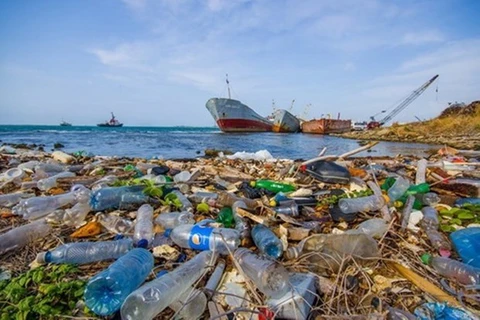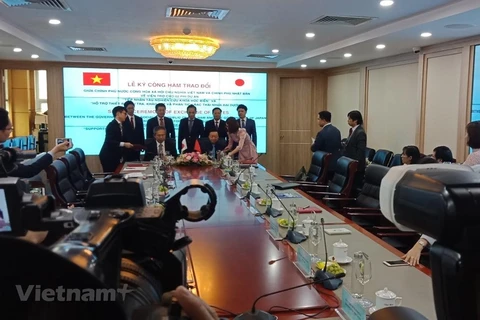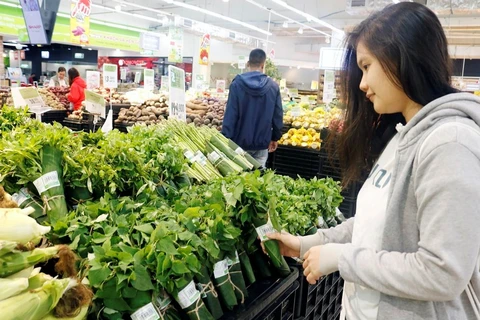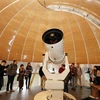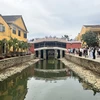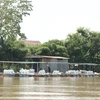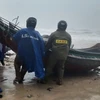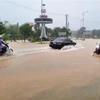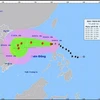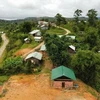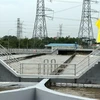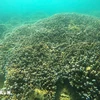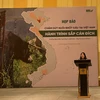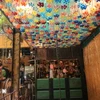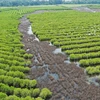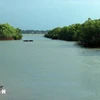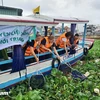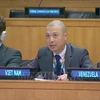 An overview of the 25th Intergovernmental Meeting of the Coordinating Body on the Seas of East Asia (IGM 25) from Hanoi. (Photo courtesy of the Vietnam Administration of Seas and Islands)
An overview of the 25th Intergovernmental Meeting of the Coordinating Body on the Seas of East Asia (IGM 25) from Hanoi. (Photo courtesy of the Vietnam Administration of Seas and Islands) Hanoi (VNA) – The first part of the 25th Intergovernmental Meeting of the Coordinating Body on the Seas of East Asia (IGM 25) wrapped up successfully after two days of working.
Speaking at the event, held in both in-person and online forms, Deputy Director General of the Vietnam Administration of Seas and Islands (VASI) Nguyen Que Lam called for efforts and engagement of all countries in dealing with plastic pollution and ocean waste.
He suggested that participants focus on discussing strategies to mobilise the involvement of countries in coping with plastic waste and ocean waste, as well as models of sustainable production and selling of plastic products, and decisive steps to be taken next, including the establishment of close partnership through the COBSEA to implement the regional action plan on ocean waste.
“I hope that the conference will produce fruitful results, contributing to creating motivation for the strengthening of unity in the region towards sustainable development and the protection of sea and coastal ecosystems, putting an end to plastic waste for a clean sea in the future,” he stressed.
The Vietnamese representative thanked the UN Environment Programme (UNEP) for close coordination as well as technical and financial support to member countries in recent years through the COBSEA.
During the two days of the online meeting, delegates from COBSEA member countries and observers shared and discussed the work done in the period 2019-2020. They also discussed the implementation of the Regional Action Plan on marine litter, solutions at various scales and levels ranging from regional technical guidance, technology, human resources, financial and also the way of cooperation between countries and organizations inside and outside the region.
The Coordinating Body on the Seas of East Asia (COBSEA) oversees the implementation of the East Asian Seas Action Plan, adopted in April 1981 and revised in 1994. The Action Plan for the Protection and Development of the Marine Environment and Coastal Areas of the East Asian Seas Region (the East Asian Seas Action Plan) aims at protecting the marine and coastal environment in the region for the health and well-being of present and future generations.
COBSEA brings together nine countries - Cambodia, China, Indonesia, the Republic of Korea, Malaysia, the Philippines, Thailand, Singapore and Vietnam - for the sustainable development and protection of the marine environment and coastal areas of the region.
Efforts are focused on addressing marine pollution, strengthening marine and coastal planning and management, and strengthened regional governance for marine environmental management.
COBSEA is one of 18 Regional Seas programmes for the sustainable management and use of the marine and coastal environment. Individual Regional Seas programmes reflect a similar approach, tailored to address regional context and environmental challenges while supporting delivery of global environmental and development goals.
In 2021, Vietnam is the alternate host country for IGM 25. Due to the complicated situation of the COVI-19 pandemic, the IGM 25 Meeting was divided into two parts. The first part of the meeting taking place from September 8-9, 2021 in both online and face-to-face format. The second part of the meeting will be held directly in Vietnam in early 2022 after the COVID-19 pandemic situation is put under control. The session will continue with discussions based on positive results in the adoption of strategic directions discussed at IGM 25’s first session.
Previously, Vietnam had successfully hosted the 20th Intergovernmental Meeting Intergovernmental Meeting of the Coordinating Body on the Seas of East Asia (COBSEA) in Ha Long city, northern Quang Ninh province. The meeting, which took place from November 2-5, 2009, saw representatives of seven member countries of COBSEA.
Organising and attending IGM 25 in the current situation is a meaningful activity. It demonstrates Vietnam's activeness and responsibility in sustainable development and protection of the regional marine environment and coastal areas, reducing ocean plastic waste, contributing to promoting commitments and effectively implementing the National Action Plan on ocean plastic waste management until 2030./.

